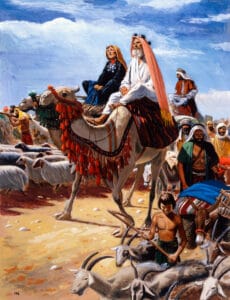Daily Lesson for Monday 21st of April 2025
In the tenth chapter of Genesis, we see the birth of various nations. The word usually translated “nations” is goyim, which also can refer to Gentiles. Genesis 10:1-32 tells us that the human race divided up into lands, languages, families, and “nations” (Genesis 10:5; see also Revelation 14:6).
Almost immediately after the introduction of this concept, God calls Abraham out of one of those nations to be different from them and from what they represent.
Read Genesis 12:1-9. Why did God call Abram (later Abraham) out from his country of origin?
God intended to use Abraham to establish a nation that would stand in contrast to human kingdoms. They were not to have a king other than God Himself. The people were to show what would happen if the human race returned to their Creator. Israel was established to be a blessing to “ ‘all the families of the earth’ ” (Genesis 12:3, NKJV). God had poured out upon the Israelites light and privileges that had not been seen in the world since, perhaps, before the Flood.
Read Deuteronomy 4:5-9. What was the Lord telling the children of Abraham, the nation that had become a fulfillment of the promise God had made to Abraham?
This was not a single individual bearing witness in a single community; this was an entire nation that, by working together and in cooperation with God, could exhibit the glory of His character. Notice, too, in the words spoken to them that it wasn’t just “statutes and judgments” that God had given them that made them so special, but their adherence to them that would cause the other nations to say, “ ‘ “Surely this great nation is a wise and understanding people” ’ ” (Deuteronomy 4:6, NKJV). However wonderful the truths given to the people, their failure to live up to them, to obey them, would bring curses instead of blessing and death instead of life.
|
How does the same principle, that of not just knowing these truths but obeying them, apply to us as Adventists today? |
 (1)
(1)



